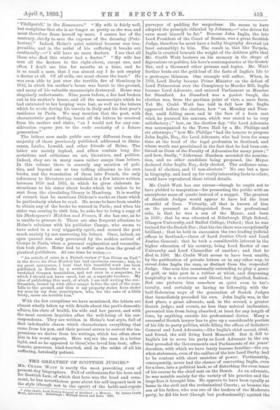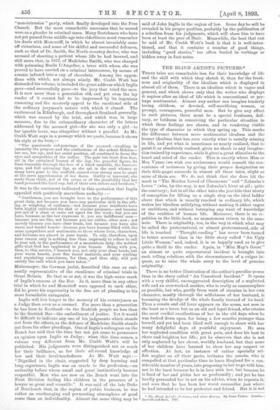THE GREATEST OF SCOTTISH JUDGES.* Mn. ORABB Warr is surely
the most provoking even of present-day biographers. Full of enthusiasm for his hero and for Scottish Law, of which that hero was the head and orna- ment, he has nevertheless gone about his self-imposed task in the style (though not in the spirit) of the habit-and-repute Jahn InpliA, LoEdd Su ice.a moral or a If yr.' 13 Jams, ("ran Watt, Advcaato. inbUrgh drVoin" alai. Sons,' 1898. Y purveyor of padding for magazines. He seems to have adopted the principle ridiculed by Johnson,—" who drives fat oxen must himself be .fet." Because John Inglis, the late Lord President of the Court of Session, was a great Scottish Judge, therefore he must have a bulky biography devoted (at least ostensibly) to him. The result is, that like Tarpeia, Inglis is crushed beneath the weight of the dubious gifts that Mr. Crabb Watt bestows on his memory in the shape of digressions on politics, his hero's contemporaries at the Scotch Bar, and a thousand other persons and topics. Mr. Watt further beats out the gold-leaf of the facts of Inglis's life to a grotesque thinness. One example will suffice. When, in 1858, Lord Derby became Prime Minister on the defeat of Lord Palmerston over the Conspiracy to Murder Bill, Inglis became Lord Advocate, and entered Parliament as Member for Stamford. As Stamford was a pocket burgh, the election was, from the partisan point of view, a mere farce. Yet Mr. Crabb Watt has told in full how M. Inglis appeared before the electors, how "on Monday and Tues- day, amid falling snow, and in the face of a keen east wind, he pursued his canvass, which was stated to be very satisfactory ; " how, on the election day, "the Lord Advocate was accompanied to the Town Hall by a Mr. Phillips and six attorneys ; " how Mr. Phillips " had the honour to propose John Inglis, Esq., the Lord Advocate, who had been for some time at the head of the legal profession in Scotland, and whose worth was proclaimed in the fact that he had been con- tinued as Dean of the Faculty of Advocates for many years ; " and how, finally, "Alderman Handson seconded the nomina- tion, and no other candidate being proposed, the Mayor declared John Inglis, Esq., duly elected. The audience num- bered 47 electors, and 11 non-electors." No one but a tyro in biography, and hard up for really interesting facts to relate, would have reproduced these trivial details.
Mr. Crabb Watt has one excuse—though he ought not to have yielded to temptation—for presenting the public with an amorphous mass of quartz instead of a nugget. The greatest of Scottish Judges would appear to have led the least eventful of lives. Virtually, all that is known of him on the personal as distinguished from the professional side, is that he was a son of the Manse, and born in 1814; that he was educated at Edinburgh High School, Glasgow University, and Balliol College, Oxford ; that he was trained for the Scotch Bar; that his rise there was exceptionally brilliant ; that he held in succession the two leading judicial offices in Scotland those of Lord Justice Clerk and Lord Justice General; that he took a considerable interest in the higher education of his country, being Lord Rector of one University and Lord Chancellor of another ; and that he died in 1890. Mr. Crabb Watt seems to have been unable, by the publication of private letters or in any other way, to reveal John Inglis the man, as distinct from the respected Judge. One sees him occasionally unbending to play a game of golf, or take part in a rubber at whist, and dispensing hospitality in a courteous and liberal, but dignified, fashion. But one pictures ; him somehow as quiet even to tad:. turnity, and certainly as having no fellowship with the half-Bohemian ways of the generation of Scotch Judges that immediately preceded his own. John Inglis was, in the first place, a great advocate, and, in the second, a greater Scotch judge; and events, no less than natural inclination, prevented him from being absorbed, at least for any length of, time, by anything outside his professional duties. Many a successful Scotch lawyer has to give up a considerable portion of hie life to party politics, while filling the offices of Solicitor. General and Lord Advocate,—like Inglis's chief coeval, rival, and friend, the still living Lord Moncreiff. But it fell to Inglis's lot to serve his party as Lord Advocate in the era that preceded the Governments and Parliaments of six years' duration, with which we have lately become familiar—the era when statesmen, even of the calibre of the late Lord Derby, had to be content with short snatches of power. Partisanship, consequently, never had the chance of converting Inglis, even for a time into a political hack, or of disturbing the even tenor of his course to the chief seat on the Bench. As an advocate, he was notable mainly for the variety of his practice and the large fees it brought him. He appears to have been equally at home in the civil and the ecclesiastical Courts ; as became the son of his father, who was one of the leaders of the Moderate party, he did his best (though but professionally) against the
"non-intrusion" party, which finally developed into the Free Church. But the moat remarkable successes that he scored were as a pleader in criminal cases. Many Scotchmen who have not yet passed from middle age into elderliness must remember his duels with Moncreiff, in which he almost invariably came off victorious, and some of his skilful and successful defences, such as that of Dr. Smith, the North-country doctor, who was accused of shooting a patient whose life he had insured, and still more that, in 1857, of Madeleine Smith, who was charged with poisoning Emile L'Angelier, a lover with whom she was proved to have carried on a criminal intercourse, by means of arsenic infused into a cup of chocolate. Among the appen- dices with which, not always wisely, Mr. Crabb Watt has
distended his volume, is included the great address which Inglis gave—and successfully gave—to the jury that tried the case.
It is now more than a generation old, and yet even the lay reader of it cannot fail to be impressed by its ingenious reasoning and the masterly appeal to the emotional side of the ordinary juryman's nature with which it closed. The excitement in Edinburgh, and throughout Scotland generally, which was caused by the trial, and which was, in large measure, due to the extraordinary character of the letters addressed by the accused girl—for she was only a girl—to her ignoble lover, was altogether without a parallel. As Mr. Crabb Watt says in a passage which we quote, because it shows his style at its best,—
" The passionate out-pourings of the accused—rivalling in intensity the prayers and the confessions of the ardent Heloise- her sex, her age, and her social position, all combined to focus the eyes and sympathies of the nation. The pale but fresh firm face, set in the curtained bonnet of the day, the graceful figure, its lines traceable through the lace of a black mantilla, the lustrous eyes, and full quivering lips, as she sat in the seat whence so many have gone to the scaffold, caused even strong men to quail at the mere apprehension of her doom. Guilty or innocent, she made them think, not of the crime or of the possibility that her hand poisoned the fatal cup, but of their own sisters and brothers."
It was to the sentiment indicated in this quotation that Inglis appealed with positively marvellous audacity :—
" Gentlemen, you are brought hero to the performance of this great duty, not because you have any particular skill in the sift- ing or weighing of evidence,—not because your intellects have been highly cultivated for that or similar purposes,—not because you are of a class or caste set apart for the work ; but you are here, because, as the law expresses it, you are indifferent men— because you are like, not because you are unlike, other men ; not merely because you have clear heads, but because you have also warm and tender hearts—because you have bosoms filled with the same sympathies and sentiments as those whose lives, characters, and fortunes are placed in your hands. To rely, therefore, upon your reason only is nothing less than impiously to refuse to call to your aid, in the performance of a momentous duty, the noblest gifts that God has implanted in your breasts Bring with you, then, to this service, I beseech you, not only your clear heads, but your warm hearts, your fine moral instincts, and your guiding and regulating consciences, for thus, and thus only, will you satisfy the oath which you have taken."
Mittermeyer, the German jurist, described this case as emi- nently representative of the excellence of criminal trials in Great Britain. Be that so or not, it was the high-water mark of Inglis's success at the Bar. In it, more than in any other trial in which he and Moncrieff were opposed to each other, did he prove his superiority in the fine art of pleading to his most formidable antagonist.
Inglis will live longer in the memory of his countrymen as a Judge than even as a counsel. For more than a generation he has been to Scotland—to the Scottish people no less than to the Scottish Bar—the embodiment of justice. 'Yet it would be difficult to indicate any one of his judgments which stands out from the others, as the defence of Madeleine Smith stands out from his other pleadings. One of Inglis's colleagues on the Bench has said that the time has not yet come to pronounce
an opinion upon Inglis as Judge ; when this time comes, a volume very different from Mr. Crabb Watt's will be published. His judgments were distinguished not so much for their brilliance, as for their all-round knowledge of law and their level-headedness. As Mr. Watt says :- " Dignified in the chair, supported by deep learning and
long experience, Inglis was an oracle to the profession,—an authority before whom small and great instinctively became respectful. Men who are now on the Bench went into the First Division feeling like children in the presence of a lawyer so great and versatile." It was said of the late Duke of Buceleuch that, in the region of public business, he was rather an overhanging and permeating atmosphere of good sense than an individuality. Almost the same thing may be said of John Inglis in the region of law. Some day he will be revealed in his proper position, probably by the publication of a selection from his judgments, which will show him to have been at least the peer of Stair. Meanwhile, the best that can be said of Mr. Crabb Watt's book is that it is well-inten- tioned, and that it contains a number of good things, including "good stories," too often buried in verbiage or hidden away in foot-notes.



































 Previous page
Previous page